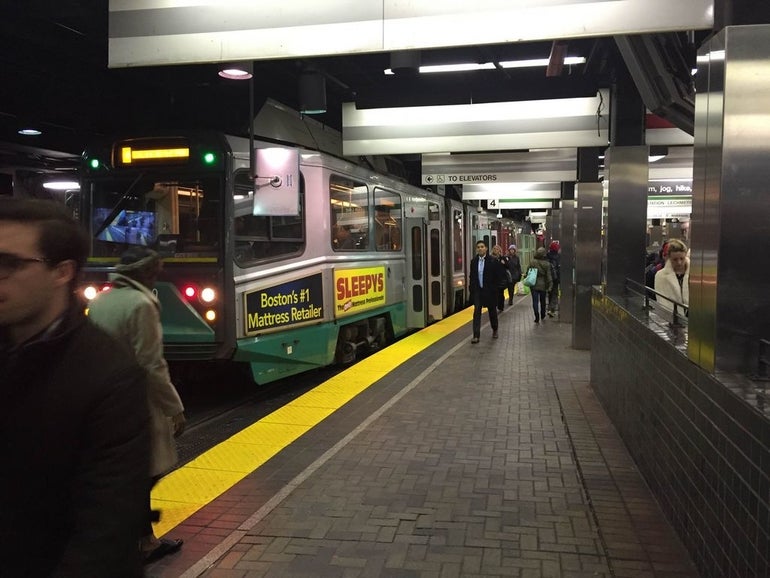Mass. $3B transit funding scheme attacked
 Courtesy Antonio Caban/SHNS
Morning commuters step off Green Line train at Park Street Station
Courtesy Antonio Caban/SHNS
Morning commuters step off Green Line train at Park Street Station
Two influential planning groups told legislators Wednesday they are not yet ready to support a bill that would open the doors to a new funding scheme for transportation projects like the Green Line Extension.
The Metropolitan Area Planning Council and A Better City both told the Joint Committee on Transportation that though they are not outright opposed to the idea, they want to take time to study value capture -- the name given to the proposed financing structure.
"A Better City agrees that there is an opportunity and need for innovative financing to support mass transit," Tom Ryan, manager of public policy and government affairs at A Better City, said. "However, the details behind value capture are in need of special attention and, if implemented inappropriately, have negative implications."
A bill (H 3877) filed by committee co-chairman Rep. William Straus would allow the property taxes on new growth in a designated area around a transportation investment to pay the bonds for the project -- with the state acting as the final guarantor.
"This would allow cities and towns to put some of the increased property taxes they would collect as a result of a transportation project being built in their city or town directly back into funding for that project," said Nicholas Downing, a government affairs specialist for MAPC. "We know that those things spur economic development and this is a way to kind of be another piece of the pie to solve the funding solution to make sure we can actually make those investments going forward."
With the estimated cost of the Green Line Extension project growing from about $2 billion to as much as $3 billion, state officials have been searching for ways to trim the cost of the trolley extension to Somerville and Medford, and find new ways to pay for it.
Transportation Secretary Stephanie Pollack has said that value capture ought to be part of the conversation since developers along proposed transit lines stand to benefit from that infrastructure.
In written testimony to the committee, MAPC Executive Director Marc Draissen said that value capture is used in other states and "must be included going forward if we are going to adequately fund our transportation system."
Ryan said he worries that value capture could stress municipal budgets, which rely heavily on property taxes.
"Under value capture legislation, many proposals would dedicate some real estate revenue, based on a transportation development, that otherwise would be used for traditional municipal costs such as teachers, firefighters and police departments," he said. "The financial strength of our municipalities is an important consideration, so we must be careful."
A Better City and MAPC -- both of which are represented on the MassDOT Value Capture Commission -- pledged to work together and with the committee to get a better sense of the funding scheme and how it could work in Massachusetts.
"We think the currently-proposed legislation would benefit from additional study and analysis before being adopted," Ryan said. "While some form of value capture may have merit, it is a small and piecemeal approach to the challenge associated with the goal of seeing a 21st century, world-class transit system that will serve both today and the future economic needs of the commonwealth."
In an e-update this week, Congressman Michael Capuano, a former mayor of Somerville, said the Green Line Extension (GLX) "may take longer and the stations may not be as fancy, but I strongly believe the GLX will be built."
"Walking away from the GLX is simply not an option," Capuano wrote. "This project is a legal obligation resulting from the Big Dig and has already been affirmed by the court. Furthermore, the $1 billion in federal funds committed to this project will go to another state if the GLX is not built. Those funds come from the Federal Transit Administration's New Starts program. Legally, Massachusetts cannot use the money for anything other than the GLX. The state simply cannot leave $1 billion in federal transportation money on the table."









0 Comments